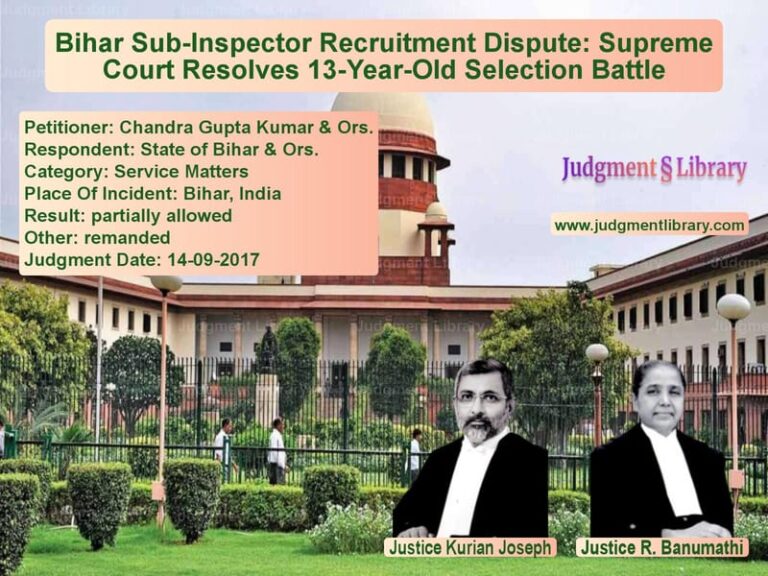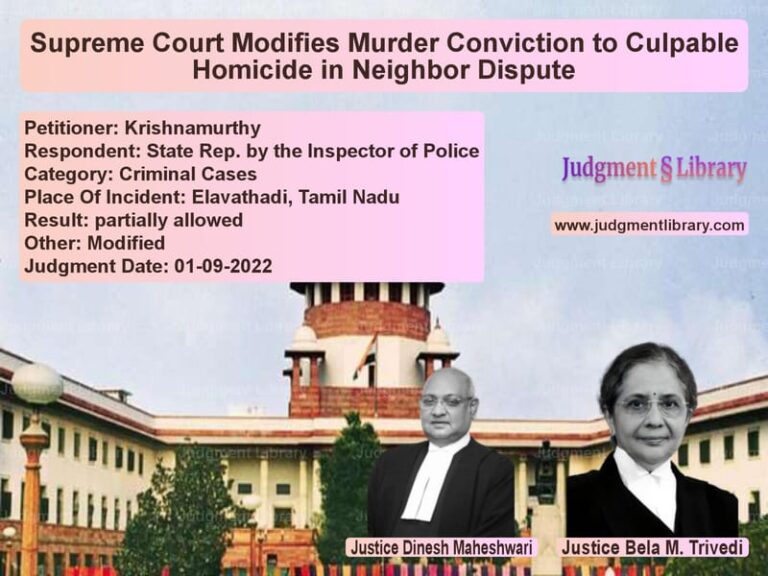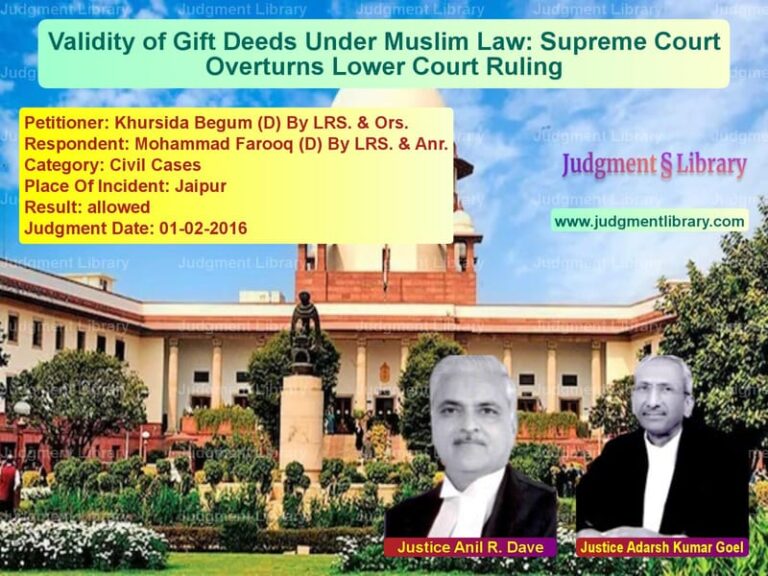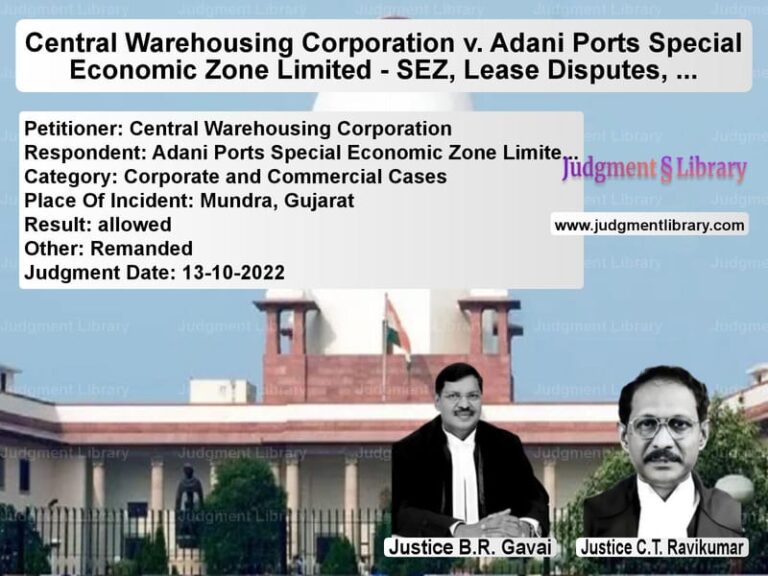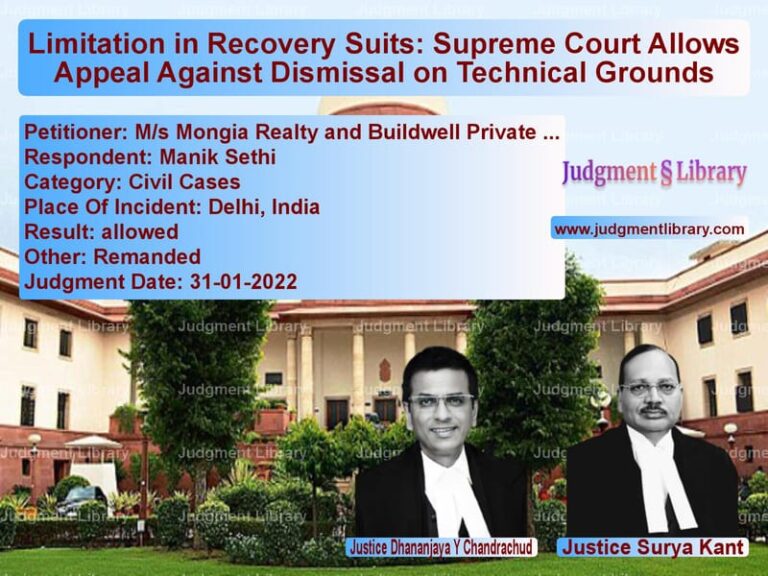Legal Analysis of Conviction Under NDPS Act: Case of Sekhar Suman Verma
The case of Sekhar Suman Verma v. The Superintendent of N.C.B. & Anr. involved the conviction of the appellant under the Narcotic Drugs and Psychotropic Substances Act, 1985 (NDPS Act). The appellant was sentenced to ten years of rigorous imprisonment and a fine of Rs. 1,00,000 by the Special Judge, NDPS Act, City Sessions Court, Calcutta. His conviction was upheld by the High Court of Calcutta, leading to the present appeal before the Supreme Court.
Background of the Case
The case originated from a search and seizure operation conducted by the officers of the Narcotics Control Bureau (NCB) on May 21, 1998. Acting on an intelligence report, NCB officials raided New Sarat Lodge in Calcutta, where the appellant was staying. During the search, 250 grams of heroin were recovered from his trouser pocket, leading to his immediate arrest.
Trial Court Proceedings
- The prosecution examined eight witnesses, while the defense presented nine witnesses.
- The Special Judge convicted the appellant under Section 21 of the NDPS Act, sentencing him to ten years of imprisonment and a fine of Rs. 1,00,000.
- Another accused, Anjan De, arrested in a separate follow-up operation, was acquitted due to lack of sufficient evidence.
High Court Decision
The appellant challenged his conviction in the Calcutta High Court, arguing that the procedural requirements under Sections 42 and 50 of the NDPS Act were not followed properly. The High Court, however, dismissed the appeal, holding that:
- The search was conducted in the presence of a gazetted officer, fulfilling the requirement under Section 42.
- The appellant was informed in writing about his right to be searched before a magistrate or another gazetted officer, as mandated by Section 50.
- The procedural safeguards were complied with, and the evidence was sufficient to establish guilt beyond a reasonable doubt.
Arguments Before the Supreme Court
Appellant’s Arguments
- The search did not comply with Sections 42 and 50 of the NDPS Act.
- His confessional statement was obtained under duress and torture.
- The prosecution’s case was based on procedural lapses, rendering the conviction illegal.
Respondents’ Arguments
- There was full compliance with Sections 42 and 50 of the NDPS Act.
- The appellant had been given the option to be searched before a magistrate or gazetted officer, which he declined.
- The recovery of heroin and the forensic report confirming it as heroin were sufficient evidence for conviction.
Supreme Court’s Ruling
The Supreme Court dismissed the appeal, holding:
- The search and seizure were conducted in compliance with legal provisions.
- The evidence presented by the prosecution, including the recovery of contraband and forensic confirmation, was convincing and credible.
- Prior judicial precedents, including State of Haryana v. Jarnail Singh and Prabha Shankar Dubey v. State of M.P., supported the legality of the procedure followed.
- The appellant’s confessional statement, even if disregarded, did not weaken the prosecution’s case.
Conclusion
The Supreme Court affirmed the High Court’s decision and upheld the conviction and sentence of the appellant. The bail granted to the appellant was revoked, and he was directed to surrender to serve the remaining sentence.
Don’t miss out on the full details! Download the complete judgment in PDF format below and gain valuable insights instantly!
Download Judgment: Sekhar Suman Verma vs The Superintendent o Supreme Court of India Judgment Dated 29-06-2016-1741872417755.pdf
Direct Downlaod Judgment: Direct downlaod this Judgment
See all petitions in Bail and Anticipatory Bail
See all petitions in Fraud and Forgery
See all petitions in Extortion and Blackmail
See all petitions in Judgment by Abhay Manohar Sapre
See all petitions in Judgment by Ashok Bhushan
See all petitions in dismissed
See all petitions in supreme court of India judgments June 2016
See all petitions in 2016 judgments
See all posts in Criminal Cases Category
See all allowed petitions in Criminal Cases Category
See all Dismissed petitions in Criminal Cases Category
See all partially allowed petitions in Criminal Cases Category


